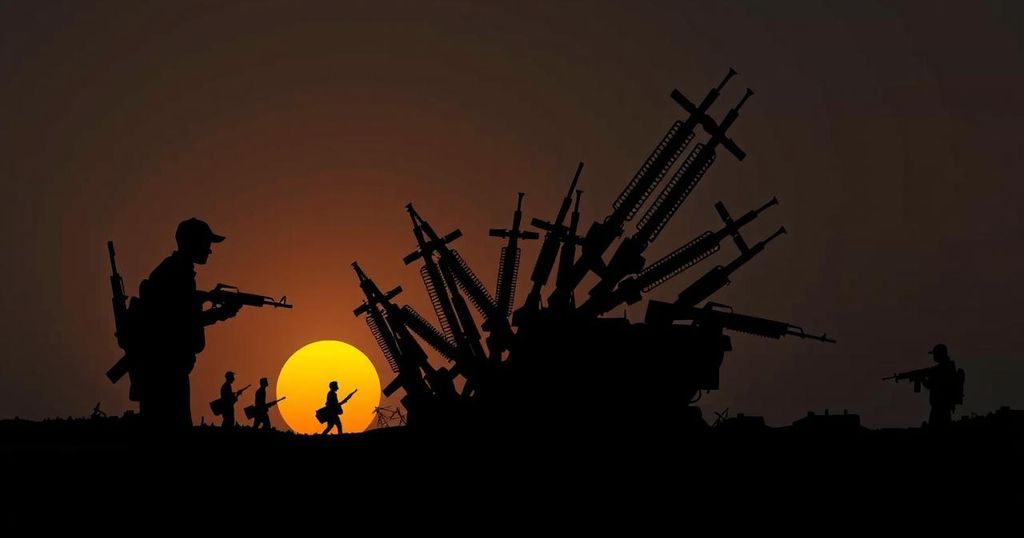Egypt’s Arms Shipment to Somalia Heightens Tensions in the Horn of Africa

Egypt has sent a second arms shipment to Somalia’s federal government, raising tensions with Ethiopia, which is concerned about potential security risks. The move is part of a broader geopolitical conflict, including disputes over water and territorial integrity in the Horn of Africa. Somalia considers countering Ethiopia’s ambitions, particularly concerning a controversial memorandum with Somaliland, while international diplomatic efforts to alleviate conflicts have not succeeded.
Egypt has recently dispatched a second arms shipment to Somalia’s federal government within a month, eliciting criticism from Ethiopia, a country that has long regarded Egypt as a rival. The Egyptian foreign ministry has confirmed this shipment, asserting that the purpose is to enhance the capability of the Somali army to ensure security, stability, and territorial integrity against the backdrop of ongoing threats from terrorism. Ethiopia’s Foreign Minister, Taye Atske Selassie, expressed apprehension regarding the implications of external support for Somalia, cautioning that such actions may exacerbate the already precarious security situation in the region, with the potential for weapons to fall into the hands of terrorist groups. The historical tension between Egypt and Ethiopia has largely revolved around the construction of a significant dam on the Blue Nile, a critical water resource for Egypt. Simultaneously, relations between Somalia and Ethiopia have soured over a controversial memorandum between Ethiopia and the self-declared independent region of Somaliland, which Somalia perceives as a territorial encroachment. Recent developments indicate an increasing alignment between Egypt and Somalia in their respective disputes with Ethiopia, particularly regarding water security. Harry Verhoeven, an expert on Africa’s energy and infrastructure, commented on the delicate balance of power in the region, noting, “Politicians know the fires they start and they can’t always control them.” With over 20 million individuals internally displaced across East Africa due to conflict and climate extremes, the potential for an arms race, as warned by Somaliland authorities, raises significant concerns for regional stability. Furthermore, Ethiopia’s pursuit of naval access through Somaliland not only complicates bilateral relations with Somalia but also highlights its aspirations to reclaim a strategic maritime position following its landlocked status post-Eritrea’s independence. Ethiopia’s intelligence chief, Redwan Hussien, acknowledged these ambitions at a recent conference, stating, “Now is the right time to fulfill it and have access to the sea.” In an escalating response, Somalia is contemplating supporting armed opposition against Ethiopia should it proceed with its maritime agreements with Somaliland, as emphasized by Somalia’s Foreign Minister, Ahmed Moalim Fiqi. Efforts to resolve tensions have been met with limited success despite international diplomatic engagements, including Turkish mediation. Previous attempts by Djibouti to offer an alternative commercial port for Ethiopia also await a response. The ongoing issuance of arms shipments from Egypt to Somalia is perceived as both a strategic alignment and a potential catalyst for further conflict in the Horn of Africa, a region already marred by instability and humanitarian crises.
The recent arms shipment from Egypt to Somalia occurs within a broader context of geopolitical tensions in the Horn of Africa, primarily involving Ethiopia’s ambitions with the Blue Nile and its agreement with Somaliland. This context includes a historical rivalry between Egypt and Ethiopia focused on water security, compounded by contemporary military and territorial disputes involving Somalia, Ethiopia, and Somaliland. As these nations engage in strategic maneuvers, the threats posed by terrorism and regional instability remain critical concerns, with the humanitarian consequences of any escalation being dire for the millions of displaced individuals across the region.
In summary, the arms delivery from Egypt to Somalia signifies a deepening military cooperation aimed at countering perceived threats from Ethiopia. The intertwined issues of water security, territorial integrity, and regional influence encapsulate the complex dynamics at play. With the potential for escalating tensions leading to conflict, regional leaders must navigate these challenges prudently to avoid exacerbating the humanitarian crisis already present in East Africa.
Original Source: www.theguardian.com








